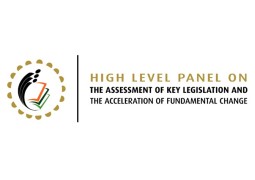
Judge Navi Pillay, who chairs the High Level Panel’s Working Group on Nation-Building and Social Cohesion, said if the panel’s report can be successfully implemented, it could set best practices of accountability that could be embraced by other Parliaments.
The former High Commissioner of the United Nations General Assembly, said what makes the report more impressive is the fact that it captured the voices and aspirations of different sectors of our society, thanks to the wide-ranging public participation initiatives that were adopted by the panel. “These included, among others, stakeholders and interest groups engagements as well as roundtable discussions with various experts who have in-depth knowledge and have conducted specific research in different thematic areas of the working groups of the panel.”
However, the Judge acknowledged that nothing would have prepared her for the awful conditions and hardship that were expressed, especially by those living in rural areas during the panel’s public hearings. “Many people from rural areas came to the panel’s public hearings in their thousands and they spoke freely with great emotion, anger and frustration. We knew that things were bad in rural areas, but when we heard the testimonies of their lived experiences, we then realised that as a country we have the best laws in place but they are not working on the ground.”
Despite all these shortcomings, I have been to 79 countries and I have never seen a public participation process as frank and robust as the one the panel had, she said.
We enjoy all these liberties because unlike other countries, we have a good Constitution and a vibrant democracy that guarantees us freedom of speech, she said. “In other countries you cannot criticise the policies of government, if you do you get detained and be subjected to harsh punishment.”
Critical in encouraging our country’s robust culture of public participation, are our Chapter 9 Institutions, she said. “What these public hearings have taught us is that Parliament needs to strengthen the public participation initiatives of our Chapter 9 Institutions. They need to educate our people more on how to access and exercise their rights and how to petition and influence change in legislation.”
In relation to the above, there was a suggestion that emerged strongly out of various public hearings that there is a need for the promotion of public education on impending or proposed legislation and effects thereof on those affected. And this should become one of the integral components of our country’s law-making processes, she said.
“Many people are of the view that Parliament should either consult them first or educate them beforehand about the intent or effect that any law it proposes would have on their lives or circumstances. And if that can be done, it could go a long way in ensuring that public education mitigates any unintended consequences of our legislation.”
The Judge said in keeping with the vision and mission of Parliament, it would be appropriate to ensure that once the panel’s report has been tabled and processed in Parliament, it becomes accessible to the public. “Once the panel’s report has been officially tabled before Parliament and gone through all of its processes, ideally it would be, as expected, appropriate to ensure that it is accessible to the public because it is, after all, a report of a Parliament of the people.”
By Abel Mputing
16 August 2017

